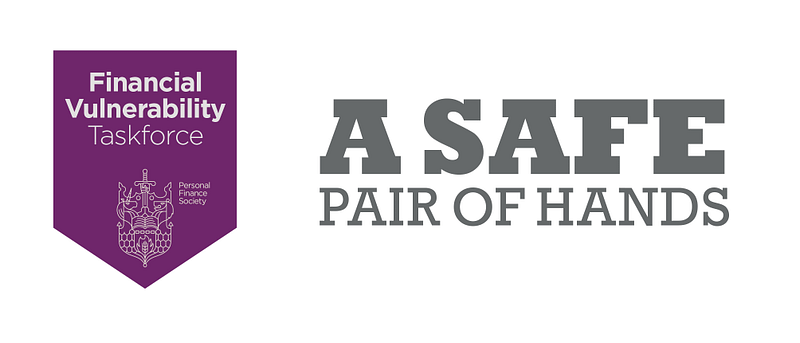AIM OF THIS POLICY
The aim of this policy is to outline the practice and procedures for the Investment & Retirement Solutions team to contribute to the prevention of detriment to clients who find themselves in vulnerable circumstances, therefore minimising the risk of harm.
The policy covers all staff within the firm, and in particular, those operating in areas that deal directly with clients.
In the spirit of openness and transparency, we have decided to share this document on our public facing website.
FINANCIAL VULNERABILITY TASK FORCE
We are proud to be a member of the Financial Vulnerability Task Force, read about our Charter commitments here

DEFINITION OF VULNERABILITY
The Financial Conduct Authority (FCA) has developed the following definition to guide work in this area:
“A vulnerable consumer to be someone who, due to their personal circumstances, is especially susceptible to detriment, particularly when a firm is not acting with appropriate levels of care.”
Vulnerability is a spectrum of risk and occurs in a variety of ways which may be permanent, temporary, or even sporadic, dependent on its nature. In many circumstances, the individual may not recognise themselves as ‘vulnerable’.
We recognise that vulnerability may not be simply due to the situation of the consumer but caused or aggravated by the actions or processes of the firms they may deal with.
We recognise that clients who might be considered as being in vulnerable circumstances could include clients with:
As a firm we must remain mindful of the potential for enquiry by these clients and the potential for any change of circumstance in respect of existing customers.
IDENTIFICATION OF CLIENTS IN VULNERABLE CIRCUMSTANCES
Vulnerability is broad and may occur at any time. It will usually involve the interplay of characteristics of the individual, their circumstances, and static or transitory status.
We only deal with customers in vulnerable circumstances where we are aware of their needs:
The nature of the need area to be addressed may also indicate vulnerability. For example, people wanting to arrange:
These could be some indicators of vulnerability but this is not designed as an exhaustive list. In the circumstances that apply to our firm we will apply additional safeguards, as appropriate, to ensure fair treatment. This will apply to each individual but where we identify groups of the same people we may establish a process aligned to the needs and circumstances of that group.
ASSESSMENT AND MANAGEMENT OF RISK
Just because somebody is vulnerable does not automatically mean that they are unsuitable for the
advice and services our firm supplies. As soon we think we may be engaging with a vulnerable consumer we will make a record of this and ensure we adhere to this policy.
When speaking to the vulnerable consumer, we will:
We will not discriminate against clients in vulnerable circumstances. Where the vulnerability is mutually recognised we will only adjust our fees where our services require extra resource to treat the client fairly. Any additional costs will not seek to profiteer from the situation and will be fully disclosed to the client before any subsequent work is carried out.
Where we feel we do not have the expertise to deal with the client due to their personal situation we will make every attempt to refer them to another firm or third party for the appropriate level of support to be provided.
Measurement of risk
To be effective, all policies need ‘measurement’: Our methodologies for the measuring the effectiveness of our vulnerable persons policy will be subject to continuous improvement as we develop policy and practices. Measurement tools include (but are not limited to):
Understanding the benefits to our firm
Supporting customers and clients who are in a vulnerable position is not just a regulatory but is also a moral responsibility. We intend to fulfil our duties in this area and as a firm we see the benefits in adopting the right approach. These include:
We will review our practices periodically for consistency and to determine adherence to the stated policy.
The following table illustrates mitigating actions for clients with mental capacity deficiencies (for the avoidance of confusion “competent person” means an individual without the limitation presented by the client):
|
Capacity Issue |
Risk |
Mitigation |
|
Language |
Client cannot fully understand important features of their agreement with us, their recommendation or the consequences of that recommendation |
Client to instruct a competent person to act as interpreter. |
|
Other communication problem created by disability |
As above |
Client to instruct a competent person to act as interpreter. Client to nominate a reasonable communication medium suitable for their disability. |
|
Mental incapacity (temporary) e.g. intoxication, mental illness |
As above plus the potential for reckless disregard for consequence |
Client to instruct a competent person to communicate on their behalf. Legal agreement must be reached outside of any period of incapacity. Client should be encouraged to seek independent professional advice. If legal agreement cannot be reached outside of any incapacity, client must provide “Power of Attorney” for a competent individual to act on their behalf. |
|
Mental incapacity (Permanent) |
As above plus the possibility that any agreement might be unenforceable as a result of known incapacity. |
Client must provide “Power of Attorney” to a competent individual to act on their behalf. |
RIGHTS & RESPONSIBILITIES
Our responsibilities:
FCA Principles for Business 2,3,6,7 & 9;
TCF Outcomes 1,2 & 4;
Conduct of Business Rules;
DEPP 6.5A.2 (calculation of enforcement fines);
Senior Manager Conduct Rules;
Individual Conduct Rules.
Responsibilities of our team:
Identification of and treatment of vulnerable clients – Client Evaluation
The table below sets out our approach to dealing with all individuals and help us to determine their circumstances and if they are in a permanent or temporary vulnerable situation. These guidelines will be distributed to all staff and each will be trained on the areas relevant to their role.
All clients will be assessed, as a minimum, against the following criteria. This is in addition to any processes we have in place for different vulnerability groups;
|
O U R
C L I E N T S
B E S T
I N T E R E S T S |
Assess the client against our vulnerability policy |
|
Actively seek to encourage disclosure about potential vulnerability |
|
|
Ensure the approach taken is accurately reflected in the business records |
|
|
Consider whether to discuss the approach with colleagues/other professionals |
|
|
Ensure the know your client information gathers sufficient details to support the advice and uses additional questioning where appropriate |
|
|
Consider any unusual aspects – e.g. if someone else is accompanying a client, is there the potential for undue influence from that person |
|
|
Understand who the client is and the extent of the instructions needed to act on e.g. Power of Attorney |
|
|
Consider whether the client is acting differently/showing signs of a change of character |
|
|
Set a list of questions to check client memory recollection, where appropriate |
|
|
When working with more than one person, is there the potential for any conflict of interest or undue influence |
|
|
Confirm any change in circumstances which might lead to vulnerability e.g. taking on caring responsibilities |
|
|
Establish whether the client’s stated needs and objectives align with their current circumstances |
|
|
Consider whether the standard sales process or specific vulnerability group process is appropriate to the client’s needs |
|
|
Identify products/solutions that are clear and easy to understand for those showing signs of vulnerability |
|
|
Consider whether there is a need to adjust the delivery and format of communications e.g. providing a report in large print |
|
|
Explain all matters with no or limited use of jargon |
|
|
Try to accommodate flexibility around appointment locations and times e.g. visiting the client at their home at their preferred time of the day |
|
|
Try to determine if the duration of the meeting will need extending to accommodate more detailed explanations and delivery of information |
|
|
Determine if the complexity of the advice will require delivery over a greater number of meetings |
|
|
Considered the accessibility of office visits for those with health conditions/disabilities |
Vulnerable Persons Policy v1.3
Investment & Retirement Solutions Ltd is authorised and regulated by the Financial Conduct Authority
Registered in England & Wales (6884783) at Ransom Hall, Ransom Wood, Nottinghamshire, NG21 0HJ
